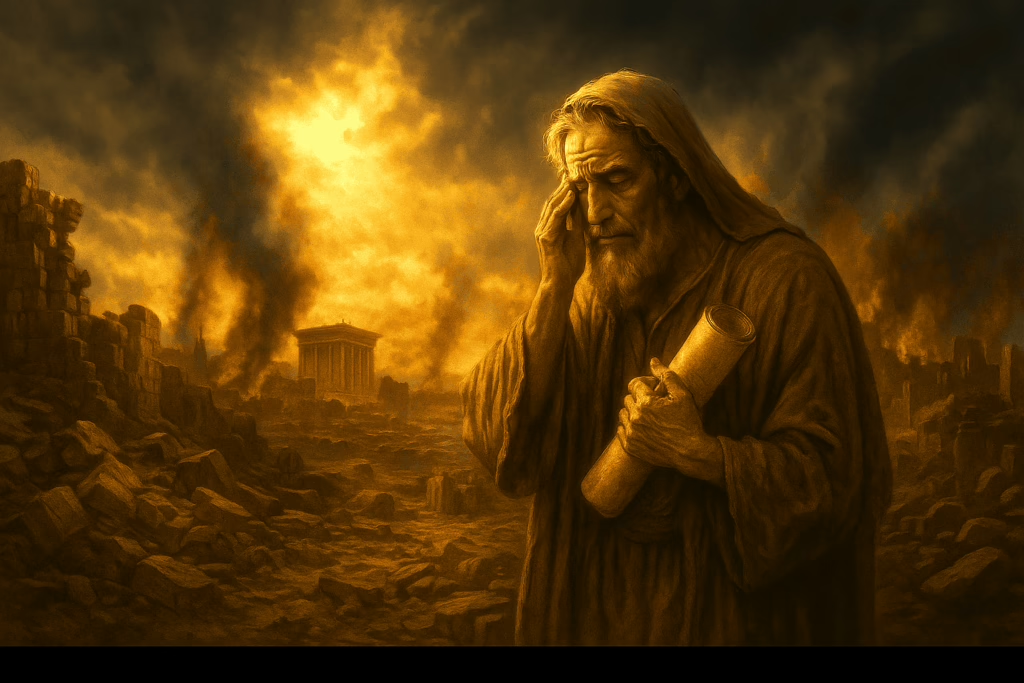The Book of Lamentations—known in Hebrew as Eichah (“How”)—is one of the most spiritual and heartbreaking books in the Bible. Written in the aftermath of Jerusalem’s destruction by Babylon, it reveals the pain of a people who have lost everything because they abandoned the L-rd.
Yet even in sorrow, this book whispers hope. G-d’s discipline is never without purpose. The same hand that allows affliction is also the hand that restores.
“How, O L-rd?” — The Cry of a Fallen City
“How lonely sits the city that was full of people!” (Lamentations 1:1)
Jerusalem—once abundant and glorious—now sits desolate, a widow among nations.
The reason is clear: idolatry.
When G-d’s people turn from His covenant, He withdraws His protection.
But the destruction was not permanent. Through the prophet Jeremiah, G-d promised that after 70 years of exile, He would bring His people back. His judgment has an end; His mercy endures forever.
Tears Without Comfort
“She weeps bitterly in the night, and her tears are on her cheeks; among all her lovers, she has none to comfort her.” (1:2)
The city that once chased after false gods now discovers they offer no comfort.
Every idol betrays; every false refuge collapses.
This is the fruit of rebellion: loneliness, bondage, and sorrow.
From Glory to Captivity
“Judah has gone into exile because of affliction… she finds no rest.” (1:3)
Sin brings slavery.
The people who were meant to live in covenant rest now wander restless among the nations. Their enemies pursue them, overtaking them in “narrow places”—moments of fear, anxiety, and distress.
The Silent Roads of Zion
“The roads to Zion mourn, for none come to the appointed feasts.” (1:4)
The mo’edim—the appointed festivals of the L-rd—stand forgotten.
Without worship, the city loses its heartbeat.
The priests groan, the virgins mourn, and bitterness fills the land.
A people created for praise now walk in silence and shame.
Enemies in Authority
“Her adversaries have become the head… for the Lord has afflicted her for the multitude of her transgressions.” (1:5)
The covenant people have fallen under foreign rule.
Their enemies live in ease, while their own children go into captivity.
G-d’s justice is precise: transgression brings consequence.
But even in judgment, He remains the covenant-keeping G-d—faithful to discipline, faithful to restore.
Splendor Lost, Strength Faded
“From the daughter of Zion all her splendor has departed.” (1:6)
The beauty of holiness is gone.
Princes and leaders stumble like deer without pasture—no nourishment, no direction.
When G-d’s presence departs, even strength becomes weakness.
Remembering the Covenant
“Jerusalem remembers… all the pleasant things that she had in days of old.” (1:7)
Finally, remembrance awakens repentance.
The Hebrew word lizkor (“to remember”) is covenantal—it means recalling a binding relationship.
Though mocked by enemies, Jerusalem’s memory of G-d stirs hope.
Because G-d remembers His covenant, He will restore.
The exile was limited to 70 years—a purposeful season of discipline.
And just as He brought His people back once, He is gathering them again today.
Conclusion
The Book of Lamentations begins with tears but ends with trust.
Jerusalem fell because of idolatry, yet G-d’s covenant love guarantees her restoration.
He disciplines to purify, not to destroy.
“For the Lord will not cast off forever. Though He causes grief, yet He will have compassion.” (Lamentations 3:31–32)
Explore more verse-by-verse studies at:
LoveIsrael.org
Discover more teachings on our channel:




